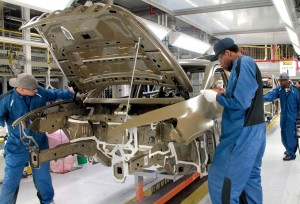
Workers at FCA's Toledo, Ohio, plant are key to the tentative deal between Fiat Chrysler and the UAW getting approved.
The fate of the United Auto Workers contract with the FCA U.S. may hinge on voting at the assembly complex in Toledo, Ohio, where workers are uneasy about the pending changes in the product plan outlined by the company’s CEO Sergio Marchionne.
The FCA employees have been concerned that the company could shift production to another plant within the manufacturing system built by the old Chrysler Group. However, Toledo now stands to lose its other key product, the Jeep Cherokee, according to Marchionne, who let the information out during an interview with the trade publication.
UAW president Dennis Williams has tried to re-assure workers that no product placement decisions have been made yet but workers at the big assembly complex, the largest in FCA U.S., remain deeply skeptical of both the pact and of Marchionne, who, in the past, has promised to do what he could to keep jobs in Toledo in return for the loyal and dedicated service of the employees that build Jeep products.
Jeep workers fear moving the Cherokee will ultimately reduce the number of jobs in Toledo and no one inside FCA U.S. has dared contradict Marchionne, who rarely seems to listen to the guidance of subordinates and runs the company and presides over its internal culture much like an old-time monarch, who firmly believes in the divine right of kings. FCA executives are quick to praise the boss but very, very few are willing to contradict him even in private.
Several UAW units, including UAW Local 7 at Jefferson North Assembly plant in Detroit, and UAW Local 372 in Trenton, Michigan, as well as units in Kokomo, Indiana, as well as a stamping plant in Sterling Heights, Michigan.
Three big assembly plants, employing roughly one-third of FCA U.S. unionized employees will vote on the Tuesday and Wednesday of this week. Sterling Heights Assembly Plant is voting Tuesday while the Belvidere Assembly in Illinois votes Wednesday.
(Union activists calling for “no” vote on tentative deal. For more, Click Here.)
But even workers at a relatively small parts depot near Los Angeles have rejected the contract as a grass-roots revolt against the tentative pact has taken hold with the help of social media.
For example, Larry Christensen, a long-time critic of the UAW executive board, used Facebook to challenge the executive board’s interpretation of the so called 25% cap, which has been a big piece of the rejection campaign.
Since more than 43% of FCA U.S. workers are now assigned to the second tier, thousands of union members would have to be raised to the first tier immediately if the cap was enforced. Only 25% of the newest hires are allowed to be kept under the pact, according to language included in the 2011 contract.
“In the addendum, the 25% cap is spelled out: “There shall be no cap on the number of Entry Level employees hired through Sept. 14, 2015. As of September 14,2015, the number of Entry Level employees shall be capped as the lesser of 25% or the existing Entry Level percentage; and those Entry Level employees by seniority above the cap, if any, shall be transitioned to Traditional Employee status,” noted Christensen in a Facebook post.
(Click Here for more details about the tentative deal between FCA and the UAW.)
“Another issue is the raises themselves. While Tier 2 hourly workers get a decent increase, the increase for Tier 1 is thousands of dollars per year shy of the inflation-adjusted value of the wage agreed to in 2007,” Christensen noted.
Furthermore, Tier 2 salaried workers in most pay grades will still see significant gaps between their pay and that of Tier 1 salaried workers. Only the top four grades will see their maximum pay increase to the equivalent of a senior UAW salaried member’s pay. The base pay for all salaried grades remains the same through the entire four years of the new contract.
There is also concern about the proposed health care co-op. The new contract doesn’t spell out the details of such a new program but it’s impossible to be specific until it’s known if Ford and General Motors will participate.
Christensen also said workers are concerned about FCA U.S. decision to move all of its car production outside the U.S.
(To see more about Marchionne’s promise of more money to workers, Click Here.)
“Moving car production to Mexico and truck production to the U.S. carries some risks. When the market tanked, car sales dropped about 28% from 2007 to 2009 but truck sales nosedived more than 50%. Changes in oil prices, 2025 EPA fuel economy standards, and the likelihood for a correction in the light vehicle sales mean the changes might not be in the best interests of U.S. workers,” Christensen said.

This sounds like a bad contract for employees.